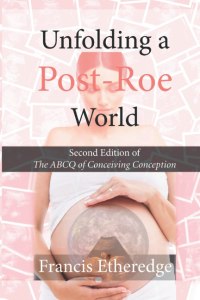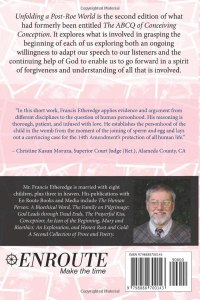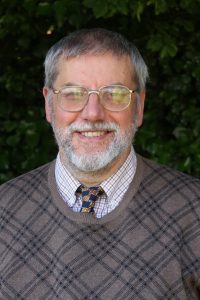 Unfolding a Post-Roe World, by Francis Etheredge (to be published soon by En Route Books and Media, St. Louis, MO, 2022).
Unfolding a Post-Roe World, by Francis Etheredge (to be published soon by En Route Books and Media, St. Louis, MO, 2022).
Reviewed by Christine Sunderland, updated December 2, 2022
In Unfolding a Post-Roe World, bioethicist and theologian Francis Etheredge updates his earlier work, The ABCQ of Conceiving Conception, by considering the Supreme Court of the United States ruling in Dobbs v. Jackson which stated, “abortion… destroys an unborn human being,” overturning the Roe v. Wade (1973) decision supporting abortion rights. Today, science (biology, embryology, genetics) defines human conception as occurring from the moment of fertilization; this first instant of fertilization begins a continuous development, culminating in showing forth this person from conception. Thus, defined as a human being, the embryo shares the same human rights as you and I, the right to life being paramount.
 The Supreme Court found no right to abortion in the U.S. Constitution and thus referred these decisions to the States. And so we ask, “Is there a right to life of the unborn in the U.S. Constitution?” We wait to see, as cases in progress argue yes, based on the 14th Amendment and its historical interpretations. For if the embryo is defined as a “person” from the moment of fertilization, with all rights and protections, then the following phrase in the 14th Amendment would be binding:
The Supreme Court found no right to abortion in the U.S. Constitution and thus referred these decisions to the States. And so we ask, “Is there a right to life of the unborn in the U.S. Constitution?” We wait to see, as cases in progress argue yes, based on the 14th Amendment and its historical interpretations. For if the embryo is defined as a “person” from the moment of fertilization, with all rights and protections, then the following phrase in the 14th Amendment would be binding:
“Nor shall any State deprive any person of life, liberty, or property, without due process of law; nor deny to any person within its jurisdiction the equal protection of the laws.”
Not only has the Supreme Court of the United States ruled, but the European Court of Human Rights has said, “human embryos [should]… not be reduced to the level of an object.” Thus, humans are not to be objects of experimentation. They are not to be frozen for future use:
“The Hippocratic Oath states: ‘I will not give a woman a pessary to procure abortion’. The Nuremburg Code says: ‘No experiment should be conducted where there is an a priori reason to believe that death or disabling injury will occur’. The Belmont Report says: ‘persons with diminished autonomy are entitled to protection’.”
Francis Etheredge re-introduces his earlier arguments in support of the embryo as a person. With the Supreme Court ruling in America, this science (and logic) is supported by law. Embryos as human beings should now be eligible for human rights protections claimed by humanity globally. The author updates the debate and considers medical ethics, philosophy, theology, and historical precedent. He reminds us that to be human is to be a member of the human race, in-relationship with one another, beginning with the mother who bears and gives birth to us, then the father, the family, the community, the nation, and the human family worldwide.
 The author adds depth with his poignant and powerful poetry, reflecting his own suffering in the loss of a child through abortion, humbly witnessing to his own tragedies. Thus, he prays that those who see the pre-born as blobs of tissue reconsider and embrace a future of life and love and inclusion. He offers them sight when they are blind.
The author adds depth with his poignant and powerful poetry, reflecting his own suffering in the loss of a child through abortion, humbly witnessing to his own tragedies. Thus, he prays that those who see the pre-born as blobs of tissue reconsider and embrace a future of life and love and inclusion. He offers them sight when they are blind.
For if we mistreat these tiny and innocent human beings, we open the door to our being mistreated as well. Eventually, tyranny will prevail, and our own rights will be threatened. We too will become disposable, our right to life and liberty denied. Francis Etheredge urges us to recognize this fact and see that “rights are integral to human existence.”
The author answers objections to his arguments, and here again, his thorough and patient reasoning and scholarship is convincing. He addresses the dignity of women, with several female contributors and testimonies. He offers supportive resources for women pressured to seek abortion.
 One testimony comes from the late Mother Teresa who cared for the poor in the slums of Calcutta:
One testimony comes from the late Mother Teresa who cared for the poor in the slums of Calcutta:
“Please don’t kill the child. I want the child. Please give me the child. I am willing to accept any child who would be aborted and to give that child to a married couple who will love the child and be loved by the child.”
And there are many today who would offer the same love and acceptance.
In addition to testimony and resources, we learn how abnormal cells of the embryo, which once were considered deforming, are sent to be used in the placenta, the nourishing sack within the womb. Abnormal cells can regenerate.
Why have these discoveries been silenced? We see that powerful financial interests are invested in the business of contraception and abortion. And yet studies have found that women are often damaged by these products and procedures preventing pregnancy. Over fifty percent of ectopic pregnancies have occurred with women who have used intrauterine devices.
Scriptural and theological evidence weaves through the discussion: Psalm 139, “For you formed my inward parts; you knitted me together in my mother’s womb…” The action of God, ensouling the child at the moment of conception completes the creation of a fully human being; this ensoulment constitutes a nature sacrament, for the “human person comes to exist, so God has acted to complete it.”
 Mr. Etheredge calls for the world community to grant human rights to the next generation:
Mr. Etheredge calls for the world community to grant human rights to the next generation:
“We stand, then, at a point in human history where it is not so much a question of personal choice determining anything and everything as choosing the truth, as it becomes more fully known concerning human conception, that will take us into a humane future of the human race or the future of the human race will be determined by the most powerful and prevailing vested interests that will determine, on utilitarian grounds, whose future it will be to be a resource for the rest of the human race.”
It is true, as Christ said, that the truth will set us free (John 8:32). We must face the truth of what we have done, this slaughter of our children. We must face the light, repent, and enact laws to end the killing of the next generation.
Francis Etheredge’s Unfolding a Post-Roe World is an important work for our times. Children are the future, humanity’s future, at least in this world. In the world to come, we shall have to answer for what we have done, or left undone, what we have said, or left unsaid, for human rights belong to all of us.
 Francis Etheredge, Catholic husband, father of eleven, three of whom are in Heaven, is author of thirteen books on Amazon. Visit him at LinkedIn and En Route Books and Media.
Francis Etheredge, Catholic husband, father of eleven, three of whom are in Heaven, is author of thirteen books on Amazon. Visit him at LinkedIn and En Route Books and Media.
 Christine Sunderland is author of seven award-winning literary novels about faith, family, and freedom. Her most recent novel is Angel Mountain (Wipf and Stock, 2020).
Christine Sunderland is author of seven award-winning literary novels about faith, family, and freedom. Her most recent novel is Angel Mountain (Wipf and Stock, 2020).
UPDATE, DECEMBER 2: This title is now available on Amazon.
